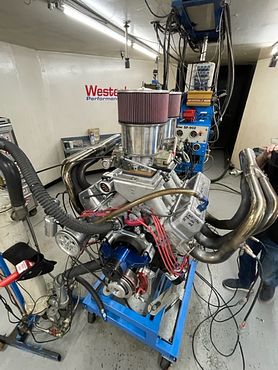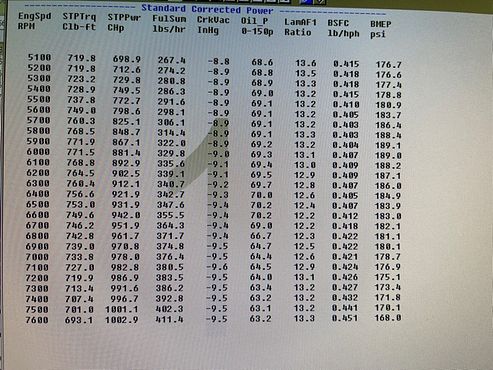I stand corrected. I didn't think about their SR-5R oil. That oil is a group IV/V blend. Judging by the SpG, it's a pretty healthy dose of group V. I was thinking of their SR-1R oil which is a tri-synthetic (groups III/IV/V). The specs remind me of LAT's racing oils. Possibly Torco makes LAT's oils. It's been a long time since I looked at those oils.ClassAct wrote: ↑Tue Dec 06, 2022 2:39 pm Are you SURE Torco is using any Group III base oils in their race oils? I didn’t ask the last time I talked to Ernie (2014) but…I didn’t ask him that. I don’t remember us ever talking about Group III base oils in any of the race oils.
LOL…if I wasn’t so damn sick I’d pick up the phone and call them just so I know. Maybe tomorrow because I feel like microwaved dog crap today.
No. In fact, the improved shear stability of synthetic base oils allows the lower viscosity those lifters want without losing hydraulic function.NewbVetteGuy wrote: ↑Tue Dec 06, 2022 3:30 pm I'll add my random oil questions to this thread as it seems to be going that way already:
Modern Synthetic Oils & Slow-Leakdown Hyd Roller Lifters: Is this combination potentially a problem or not?
The focus on fuel economy has driven the required HTHS of modern oils lower. This really only pertains to common brand oils in light viscosities like 0W-20 and 0W-16.NewbVetteGuy wrote: ↑Tue Dec 06, 2022 3:30 pm My understanding is that all the new fuel economy-focused oil-certifications are driving decreasing High-Temp / High-Shear (HT/HS) values for oil, but sheer stability is important when forcing oil through increasingly small hyd lifter passages.
-There was a series of LOONG threads about Morel lifter noise and the conclusion was a pretty authoritative statement that they work better with an oil with an HT/HS of 3.8-4.1 cP. BUT when I look at the SAE viscosity table, it seems to require a 50 weight oil to get to 3.7 cP...
Note that group III based synthetic oils will almost always produce a higher HTHS than group IV/V blend synthetics. This is simply due to the higher density of the group III base oil. The exception is when a group IV/V blend has a lot of polyol or adipate ester.
You have to look at the HTHS relative to the kinematic viscosity @ 100°C (KV100). An oil with a KV100 of 10.5 cSt and HTHS of 3.3 cP is more shear stable than an oil with a KV100 of 12.0 cSt and HTHS of 3.3 cP. SAE J300 only requires a minimum HTHS for each grade, no maximums. A 50 grade must have an HTHS ≥3.7 cP but note there's a lot of 40 grades and even some 30 grades with an HTHS ≥3.7 cP.
Red Line HP 5W-30 = 3.7 cP
Red Line HP 10W-30 = 3.7 cP
Driven XP3 10W-30 = 3.7 cP
Some other 30 grades hang in there pretty close.
Amsoil Dominator 10W-30 = 3.6 cP
Driven LS30 5W-30 = 3.5 cP
HPL Bad Ass 5W-30 = 3.5 cP
Where was it stated that Morel lifters like an oil with 3.8-4.1 cP? There's several 40 grade oils that fall in that range.
HPL Bad Ass 5W-40 = 4.0 cP
HPL HDMO 5W-40 = 3.9 cP
Red Line HP 0W-40 = 4.0 cP
Driven DT40 5W-40 = 3.9 cP
Among others. However, the sweet spot for Morel lifters should be in the 3.3-3.7 cP range or about 10-15 cSt KV100. The HTHS is really more relevant to the bearings than it is the lifters.
The HTHS is measured at 150°C and 10^6s-1 shear rate. That's pretty common bearing load in many race engines and hot street engines with power adders. You can reduce bleed down with a lower oil viscosity, but that's not the case with Morel lifters. They bleed down slower than others, hence the need for a lower viscosity oil.NewbVetteGuy wrote: ↑Tue Dec 06, 2022 3:30 pm My understanding is that the HT/HS value is based upon 150 degree C oil temps; the actual viscosity is going to be greater at lower temps, so can you just reduce oil temps to prevent lifters from bleeding down pre-maturely with the same grade of oil?
The solubility issues with group IV PAO base oils are solved by blending in low amounts (5-15%) group V ester. Esters are highly polar and aid in additive solubility and response. It can't quite match group III in this regard, but can get pretty close. You would have to bump the ester to the 25+% range to beat group III in solubility which would actually work against you as too much ester can strip anti-wear films. Red Line had issues with this for a while before they lowered the ester content.NewbVetteGuy wrote: ↑Tue Dec 06, 2022 3:30 pm @RDY4WAR: You mentioned earlier that Grade IV base stocks have solubility problems with some additives and mentioned Zinc/ZDDP specifically; does this mean if someone's looking to add their own ZDDP additive to an off-the-shelf oil that they'd be better off starting with an engine oil that appears to be from Grade III basestock? (Which I THINK you can guess at based upon the higher Pour Point temp rating from the SDS?...)
The ZDDP supplements are usually blended in a cheap group I carrier oil that'll provide its own solubility. Like mentioned though, any oil that's majority group IV will already have group V blended in to aid in solubility. Some supplements use a polymeric carrier, such as a thick olefin copolymer (liquid rubber), which can cause solubility issues with oils containing group V. Esters will not solubilize polymers. The result is the supplement just globs in the pan and provides no benefit. That or it gels up and clogs your oil filter. I've seen that a time or two.
I never recommend playing backyard chemist with a supplement. Even supplements that have beneficial additives can have adverse affects. For example, a fully formulated oil with a careful balance of ZDDP to detergents and synergy with friction modifier and extreme pressure additives can be thrown out of balance by the supplement, causing the FM and EP additives to become weaker, the detergents diluted, and ZDDP, despite being a higher concentration, is less effective due to lost synergy with other additives. A lot of oil formulating is finding that sweet spot where different additives play well with one another. Additive clash can be a problem if that's not considered.




